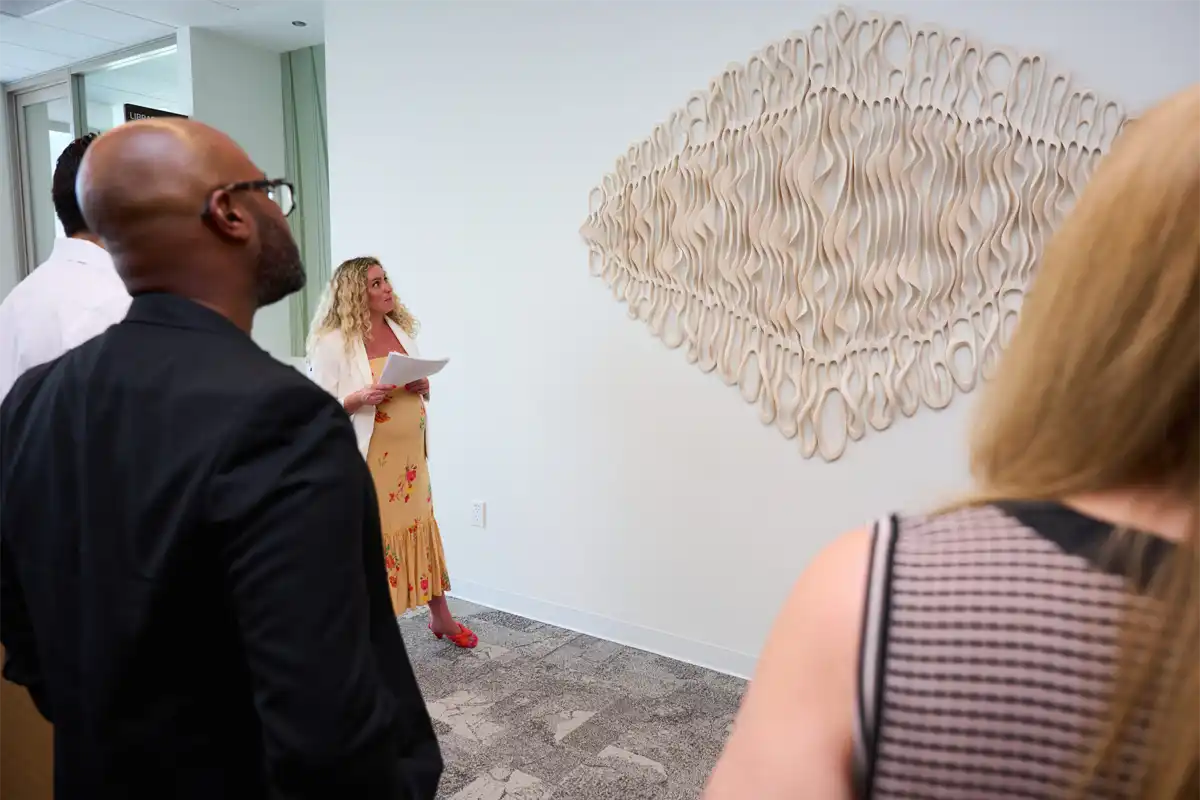The terms art advisor and art consultant are often used interchangeably, but there are some key differences between the two. In this article we’ll explore those differences and explain why it’s important for clients to understand the unique skillset of each. If you’re in charge of hiring an expert to help your company acquire art, read on to learn more.
Art Consultant vs. Art Advisor: The Short Answer

Both art consultants and art advisors serve as guides to help their clients acquire artwork. The difference between the two lies primarily in the reason for the art acquisition.
Art consultants primarily focus on helping clients integrate art into various environments. For corporate art consultants, those environments are usually workplaces, commercial developments, and public spaces. Goals for incorporating art into a commercial or business setting can range from enticing employees back to the workplace by enriching the environment, to telling a brand story, or connecting with the community.
Art advisors, on the other hand, typically focus on the investment side of art acquisition. They use their expertise to guide collectors in making wise acquisitions that balance aesthetic appeal with market potential. Their role often involves conducting thorough market analysis and tracking art market trends.
Why it’s Important to Understand the Difference between an Art Advisor and an Art Consultant

It’s important to understand what the difference is between an art advisor and an art consultant to ensure your organization hires the right expert to achieve your goals for the art.
If you want art to enhance the environment of your property, or showcase your corporate identity and culture, you need an art consultant. On the other hand, if you want guidance on how to best maintain your corporate art collection to stay ahead of market trends, an art advisor is the expert you need. Understanding these distinctions will allow you to make informed decisions that can increase the potential of the art within your organization.
Art Consultant – A Detailed Definition

Corporate art consultants specialize in embedding art into companies as tools for branding, culture, and employee engagement. They’re art experts immersed in the art world, making connections, and maintaining a database of thousands of vetted artists in every style of art.
Top art consultants are certified project managers who oversee the entire process of art acquisition for their clients, from art discovery to selection, fabrication, and installation.
The art consultants at Art + Artisans also specialize in leading corporate art selection committees. Our four-step process ensures everyone’s ideas are heard and that consensus and excitement about the final art package is achieved.
Art consultants should be equally comfortable in the worlds of architecture, interior design, and construction. They work closely with architects and interior designers to ensure the artwork complements the visual narrative of the property design.
A+A project managers provide time and money-saving guidance to clients about which artworks can be supported by a project’s specified materials. They advise clients on the right structure needed to hang or otherwise support artwork. They also coordinate with general contractors and visit construction sites to ensure all installation specs have been followed.
Art Advisor – A Detailed Definition

Art advisors focus heavily on the investment potential of art, guiding clients in building valuable collections that align with their tastes and investment goals. They usually oversee the care and management of their clients’ art collections with the goal of maintaining the financial and cultural value.
Like art consultants, art advisors maintain an extensive network of artists and gallerists in order to provide access for their clients. However, art advisors usually specialize in particular areas, such as a certain period, region, or type of art.
Part of protecting their clients’ financial investment means art advisors are skilled at assessing art for factors like provenance and authenticity.
They ensure their clients’ collections are properly insured and documented, and they connect them with the right experts to conserve their art.
Art advisors also offer strategic advice about when to sell or acquire new pieces. They stay informed about art market trends, offering insights that help clients make timely acquisitions or sales, optimizing the potential financial return of a collection. They often maintain long-term relationships with their clients which allows them to continually refine and expand a client’s collection, ensuring it retains its cultural and financial worth.
The services of art advisors and art consultants can overlap. For example, in addition to specializing in corporate art consulting services, Art + Artisans offers corporate art collection management services including corporate art acquisition strategy, art appraisal services, and corporate art collection inventory and assessment.
Conclusion
Art advisors and art consultants each provide distinct services tailored to their clients’ specific needs. Art advisors focus primarily on building and managing art collections with financial growth in mind. Their services include evaluating art for purchase, assisting in negotiations, and providing investment insights. Art consultants on the other hand, specialize in selecting and displaying art that aesthetically enhances a space and elevates the experience. Their services involve curating pieces that fit the thematic and visual goals of a setting. They also manage the entire art acquisition process from discovery to installation. While advisors might produce analytical reports, consultants offer creative concepts and visual strategies. Ultimately, the choice between an art advisor and an art consultant depends on whether the priority is financial return or atmospheric enhancement.
Learn More about the Roles of Art Advisor and Art Consultant
-
- Our Services [Art + Artisans]
- What Art Consultants Actually Do on Commercial Real Estate Projects [Art + Artisans]
- The Role of the Art Advisor [Sotheby’s]
- Tips for Building a Corporate Art Collection [artworkarchive.com]


